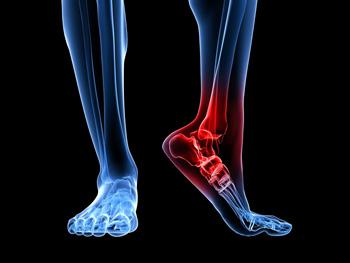Freehold (732) 294-9393
Freehold (732) 294-9393
 The portion of tissue that is found on the bottom of the foot is called the plantar fascia. It connects the heel to the toes, and helps to provide flexibility to the foot while walking and running. When this band of tissue becomes inflamed as a result of an injury or from overuse, the condition plantar fasciitis may develop. The symptoms that are generally associated with this condition can include severe pain and discomfort in the heel and surrounding area, and this pain may be worse in the morning after arising. Some patients find mild relief when the affected foot is rolled on a cold bottle, as this may be helpful in relaxing the affected muscles. If you suffer from plantar fasciitis, it is strongly suggested that you are under the care of a podiatrist who can properly treat this condition.
The portion of tissue that is found on the bottom of the foot is called the plantar fascia. It connects the heel to the toes, and helps to provide flexibility to the foot while walking and running. When this band of tissue becomes inflamed as a result of an injury or from overuse, the condition plantar fasciitis may develop. The symptoms that are generally associated with this condition can include severe pain and discomfort in the heel and surrounding area, and this pain may be worse in the morning after arising. Some patients find mild relief when the affected foot is rolled on a cold bottle, as this may be helpful in relaxing the affected muscles. If you suffer from plantar fasciitis, it is strongly suggested that you are under the care of a podiatrist who can properly treat this condition.
Plantar fasciitis is a common foot condition that is often caused by a strain injury. If you are experiencing heel pain or symptoms of plantar fasciitis, contact Dr. Henry Miller from New Jersey. Our doctor can provide the care you need to keep you pain-free and on your feet.
What Is Plantar Fasciitis?
Plantar fasciitis is one of the most common causes of heel pain. The plantar fascia is a ligament that connects your heel to the front of your foot. When this ligament becomes inflamed, plantar fasciitis is the result. If you have plantar fasciitis you will have a stabbing pain that usually occurs with your first steps in the morning. As the day progresses and you walk around more, this pain will start to disappear, but it will return after long periods of standing or sitting.
What Causes Plantar Fasciitis?
There are some risk factors that may make you more likely to develop plantar fasciitis compared to others. The condition most commonly affects adults between the ages of 40 and 60. It also tends to affect people who are obese because the extra pounds result in extra stress being placed on the plantar fascia.
Prevention
There are a variety of treatment options available for plantar fasciitis along with the pain that accompanies it. Additionally, physical therapy is a very important component in the treatment process. It is important that you meet with your podiatrist to determine which treatment option is best for you.
If you have any questions, please feel free to contact our office located in Freehold, NJ . We offer the newest diagnostic and treatment technologies for all your foot care needs.